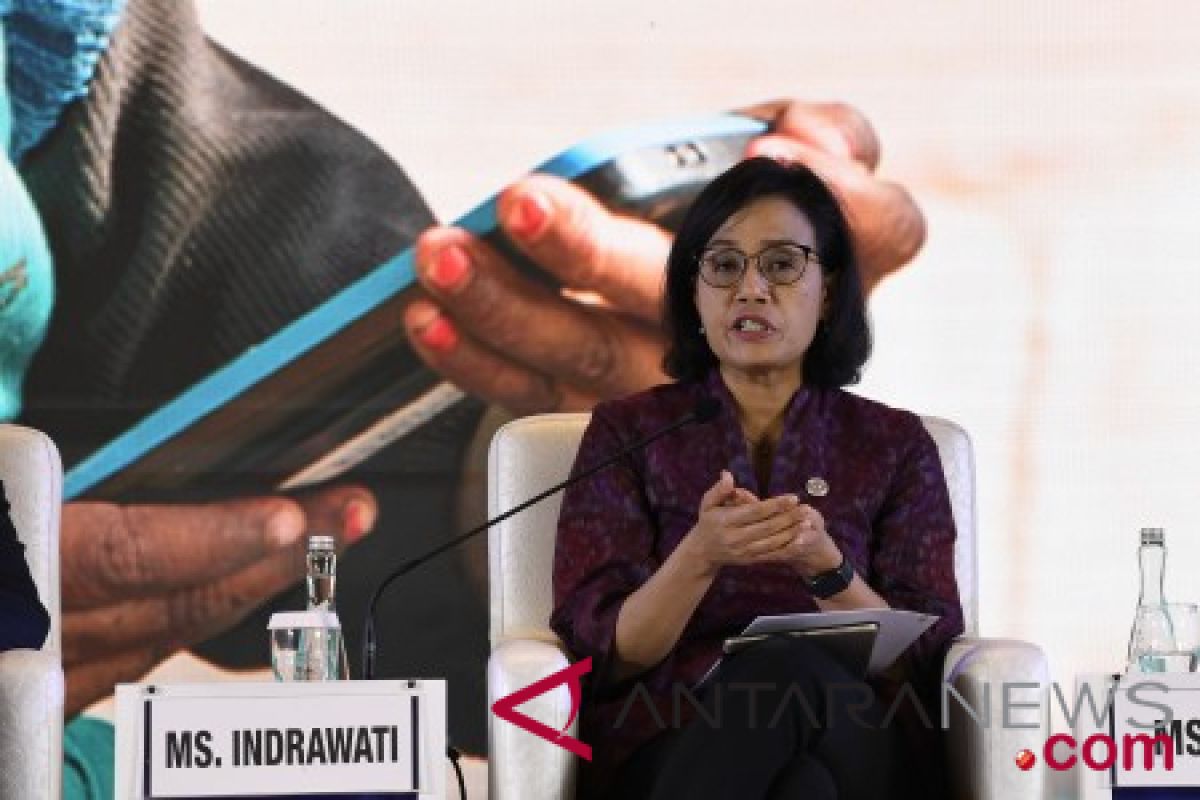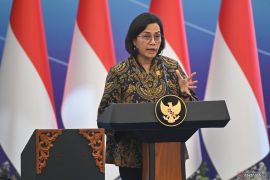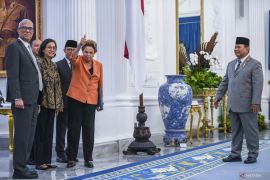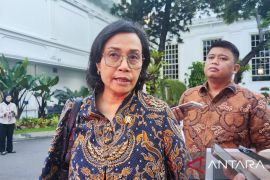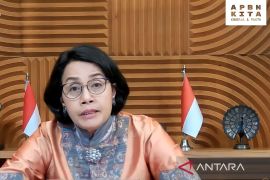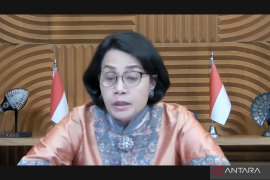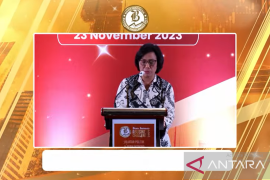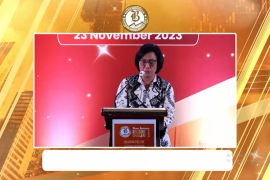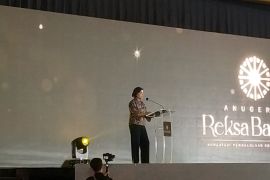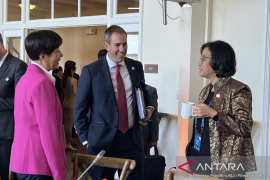"Implementing Sharia-based financing under the scheme is an alternative platform that is good, on both a local and global scale," Mulyani stated during a discussion titled, "Investor Roundtable on Islamic Infrastructure Finance" held on the sidelines of the 2018 IMF-WB Annual Meeting in Nusa Dua, Bali, Wednesday, (Oct 10).
She noted that Indonesia continued to seek financing from the private sector to finance infrastructure development projects to support the nation`s economic growth.
Mulyani admitted that the state budget was largely limited to building infrastructure, so financing from sharia-based private players held significance.
Based on the latest report, some US$3-4 trillion per year until 2030 was required for global infrastructure projects.
However, the amount of funding to be provided by the government and multilateral financing institutions will only reach $300 billion per year.
McKinsey research institute also noted that institutional investors currently have funds of $120 trillion stored in banks. Hence, the private sector has a good opportunity to play an important role in overcoming the funding difference.
Sharia finance
In the past decade, the Islamic finance industry has become an economic model that has witnessed swift development in the global financial system.
In fact, several reports indicated that Islamic finance has grown rapidly in the past three decades, reaching a value of $1.6 trillion and involving large and small investors across the world.
With growth of the Muslim population globally, including in the United States and Europe, financial analysts estimate that Islamic finance is a sector with huge potential today and continuing in future.
In October 2014, for instance, Luxembourg had issued a five-year Islamic bond, known as a "sukuk," worth $254 million. Meanwhile, in September 2014, Hong Kong had completed its first sale of Islamic debt, raising $1 billion.
However, Luxembourg was not the first Western country to issue a sukuk, as Britain had issued securities based upon Sharia principles in June 2014.
Sukuks also attracted Goldman Sachs and HSBC, two Western financial giants, which introduced their Sharia financial products within the past few years. Moreover, over the past decade, several banks in the United States have established mortgage and loan programs for their Muslim customers, based upon the Islamic law.
In April 2017, Saudi Arabia issued its largest Sharia bond on the Irish Stock Exchange. Islamic bonds, or sukuks, worth $9 billion, resulted in orders valued at more than $33 billion.
A report on Islamic finance published by the US Council on Foreign Relations a few years ago stated that assets held by Islamic Sharia-based banks continue to grow by more than 15 percent per year. Analysts forecast that the potential of Islamic financial markets could reach several trillion dollars within years.
The continuing growth of Islamic finance is a global phenomenon, noted Ibrahim Warde, an Islamic finance expert at Tufts University, the United States.
According to Warde, Islamic finance, in general, has benefited from the financial crisis, mainly since Islamic financial institutions have performed better than conventional financial houses.
One of the fundamentals of Islamic finance -- apart from not charging interest -- is that there must be a direct relationship between financial products and the real economy.
These are features that result in a Sharia economy being more interesting, he added.
Resistance
Researchers from Taibah University, Saudi Arabia, Faisal Alqahtani and David G. Mayes, in their scientific report published in 2017, explained that the resistance Islamic financial institutions faced during the global crisis is because Sharia principles prevented conventional institutions from applying mortgaged-backed securities (MBS) collateralized debt obligations (CDO), and credit default swaps (CDSs).
Such financial practices and instruments are believed to be responsible for the global crisis, which are prohibited in Islamic-based banks.
In contrast, conventional financial institutions that implement these every-day practices were the most-affected by the crisis and eventually collapsed.
Hence, Saudi economist M.U. Chapra believes that avoiding those practices that trapped conventional banks and adopting the principles of Islamic banking would minimize the severity of the financial crisis.
At least four points make Sharia economic concepts and practices unique and different from conventional financing.
First, Islamic Sharia forbids adding value in the repayment of debts or other financial transactions, such as savings, which is known as interest, or "riba."
Secondly, Islam forbids transactions that are not yet clear, whether the items are being traded are contracts (agreements) or parties involved in transactional activities. In Islam, this is called "gharar," which means obscurity.
Third, there must be no "maysir" or "qimar" practice, involving betting or gambling in Islamic financial transactions.
The practice of gharar and maysir/qimar in conventional financial transactions is found in products, such as insurance and stock trading in conventional exchanges.
In addition to these three practices, Sharia prohibits investing in businesses that contain unlawful elements, such as entertainment that provides gambling facilities, free sex, and selling alcohol, as such products are forbidden in Islam.
The concepts of Islamic economics were introduced and practiced by Prophet Muhammad, peace be upon him, and his followers 14 centuries ago. During this time, the teachings and application of Sharia economics never changed.
Currently, several parties have begun to look at the Sharia economy, which has proven resilient during the global crisis because it does not practice conventional principles, to engage in conventional financial transactions.
However, during a discussion at the IMF-WB meeting, Mulyani said although the potential source of funding from Muslim investors is quite large, institutions are reluctant to engage in conventional financial practices since it is impossible to combine Sharia and conventional systems, as each system is derived from two opposing ideologies.
Considering that the Sharia economy is more than 14 centuries old, and its teachings and practices have remained pure during such a long period, it is impossible to involve Islamic economics in a platform in which there are still practices of usury, obscurity, gambling, and investments that are prohibited by Islamic law.
A Sharia economy`s involvement in the financing of development projects requires a broad and free path from practices that are forbidden by Islamic law. This aims to provide certainty for Muslim investors that the businesses they are working with operate in accordance with Islamic teachings to ensure that the implementation and results will be optimal.
Reporting by Libertina W A
Edited by Eliswan Azly
Reporter: Libertina
Editor: Eliswan Azly
Copyright © ANTARA 2018
